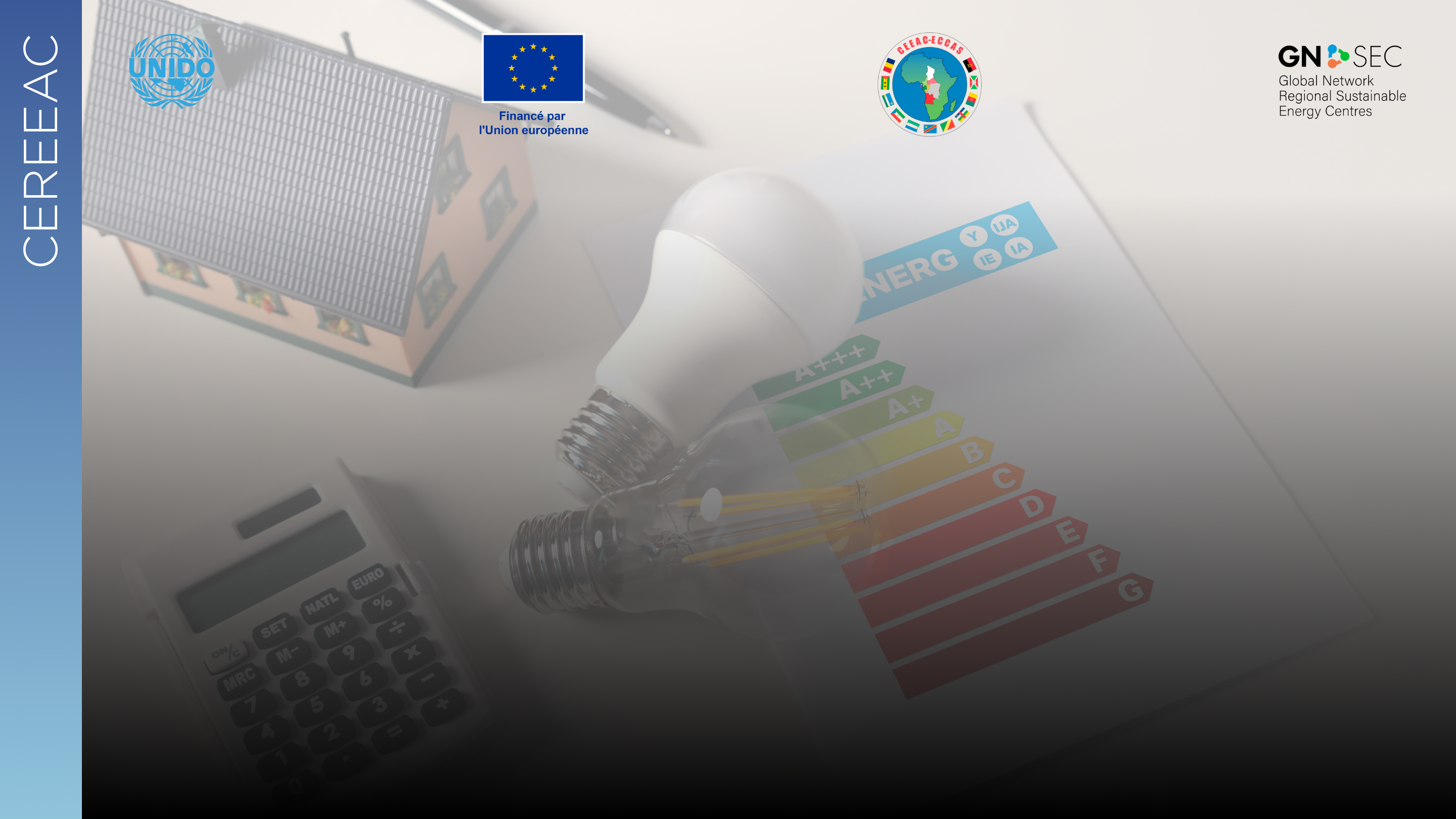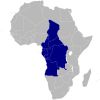Against a backdrop of strong growth in energy demand in the Economic Community of Central African States (ECCAS) region, improving the energy efficiency of equipment is a strategic lever for addressing environmental, economic, and social challenges. In accordance with its mandate, the Center for Renewable Energy and Energy Efficiency (CEREEAC) has launched a structuring project for the development of Minimum Energy Performance Standards (MEPS) applicable at the regional level, with funding from the European Union and technical support from UNIDO.
The ECCAS region has an average electrification rate of 47%, with significant variation between countries, ranging from 11% to 93%. According to the United Nations Framework Convention on Climate Change[1], electricity for lighting accounts for nearly 15% of global electricity consumption and 5% of global greenhouse gas emissions.

Source : AERE[2]
1. A strategic framework for regional energy harmonization
MEPS are an essential regulatory tool for setting minimum performance thresholds for household, industrial, and commercial equipment. Their adoption aims to:
- Reduce overall energy consumption;
- Limit greenhouse gas emissions;
- Promote efficient technology markets;
- Protect consumers from obsolete or energy-intensive equipment.
In a region characterized by heterogeneous national regulations, the CEREEAC initiative aims to lay the foundations for a common, coherent, and technically robust framework, while respecting the specificities and levels of development of member countries.
2. An inclusive and rigorous methodological approach
The project is based on a participatory, evidence-based approach, mobilizing key stakeholders in the region: energy ministries, standardization bodies, research institutions, economic operators, and development partners.
The methodology adopted includes:
- A regional diagnosis of existing energy standardization policies;
- An analysis of equipment import flows to identify priority categories;
- A review of existing international and African standards (AFREC, ARSO, cooperation agencies);
- Multi-stakeholder technical consultations to ensure local ownership of future standards.
3. Regional dialogue reinforced by a high-level webinar
As part of this process, a webinar was organized on August 28, 2025, under the supervision of CEREEAC and UNIDO, with technical support from AERE (Alternatives for Energy, Renewable Energy, and the Environment), recognized for its expertise in energy transition and environmental sustainability, and financial support from the European Union. This meeting enabled a wide audience to discover how Minimum Energy Performance Standards (MEPS) are a real lever for transformation in Central Africa.

The presentations showed that the adoption and harmonization of these standards go beyond the purely technical dimension. They represent a concrete tool for reducing energy consumption, lowering household bills, increasing economic competitiveness, and supporting countries' climate commitments. As the ECCAS representative pointed out, the key challenge remains to translate these standards into tangible results for the region's populations and energy systems.
The Head of Cooperation at the European Union Delegation to the Republic of Congo presented an overview of the actions carried out by the European Union, in particular through its Global Gateway strategy. This strategy aims to build strong partnerships, mobilize and stimulate investment to create jobs and promote green and inclusive economic growth.
In addition, the successful experience of the EELA project in Eastern and Southern Africa was highlighted as a valuable source of inspiration for Central Africa.
The richness of the discussions and the quality of the questions raised by the participants confirmed the strategic importance of this project, as well as the scale of the collective work that remains to be done to achieve the common objectives. The message is clear: our regional actions are part of a global dynamic and, together, we have the capacity to build a more sober, sustainable, and resilient Central Africa.
4. Regional momentum in support of climate and energy objectives
The development of NMPEs is in line with Member States' commitments:
- Nationally Determined Contributions (NDCs);
- Sustainable Development Goals (SDGs), in particular SDG 7 on access to clean and affordable energy;
- National roadmaps for energy efficiency.
This process also contributes to:
- Strengthening institutional capacities;
- Improving the quality of equipment on local markets;
- Stimulating technology transfer in the region.

Source: U4E, AFREC, Regional assessment of savings for the Central Africa region, 2024
The introduction of minimum energy performance standards, accompanied by a rigorous compliance framework, paves the way for significant financial savings by reducing energy consumption. These instruments optimize energy efficiency, mitigate demand and peak loads, reduce electricity bills, and limit greenhouse gas emissions.
The 2024 report of the United Nations Environment Programme highlights the progress made in the ECCAS region thanks to improvements in the energy performance of equipment. It also highlights the need for complementary actions: product labeling, market control, financial incentives, etc., to ensure a sustainable and systemic transformation of the market.
5. Next steps
The current phase of the project, which is being finalized, will enable a set of policy and technical recommendations to be proposed for political and technical validation through a regional consultation process.
CEREEAC, with the support of its partners, will continue its efforts to:
- Support states in implementing the adopted standards;
- Organize capacity-building activities;
- Deploy monitoring mechanisms;
- Launch awareness campaigns.
6. Conclusion
The regional development of NMPEs represents a significant step forward for the Central African region and for Africa as a whole. By consolidating a harmonized framework adapted to local realities, CEREEAC, which is part of the Global Network of Regional Sustainable Energy Centers (GN-SEC), reaffirms its role as a catalyst for energy transition in the region. The GN-SEC has become a driving force for the harmonization of the continental electricity market within the framework of the African Union and has already contributed to the adoption of minimum energy performance standards (MEPS) in other African regions, such as SADC, ECOWAS, and EAC. The aim is not only to rationalize energy consumption, but also to lay the groundwork for more sustainable, inclusive, and resilient economic development.
To watch the webinar: https://youtu.be/PbPdqhRnuk0?si=4YGpC2-raCHy7KPH
Author: Ms. Georgette FUMTCHUM TAMKO and CEREEAC Team
Date: September 2025
Contact: g.fumtchum@unido.org
More information: www.cereeac.org
[1] https://unfccc.int/climate-action/momentum-for-change/activity-database/momentum-for-change-enlighten-initiative - December 2024
[2] According to World Bank data, indicator name: electricity access rate (% of population) – Version 09/19/2024







